English around the world(山东省东营市)
文档属性
| 名称 | English around the world(山东省东营市) |
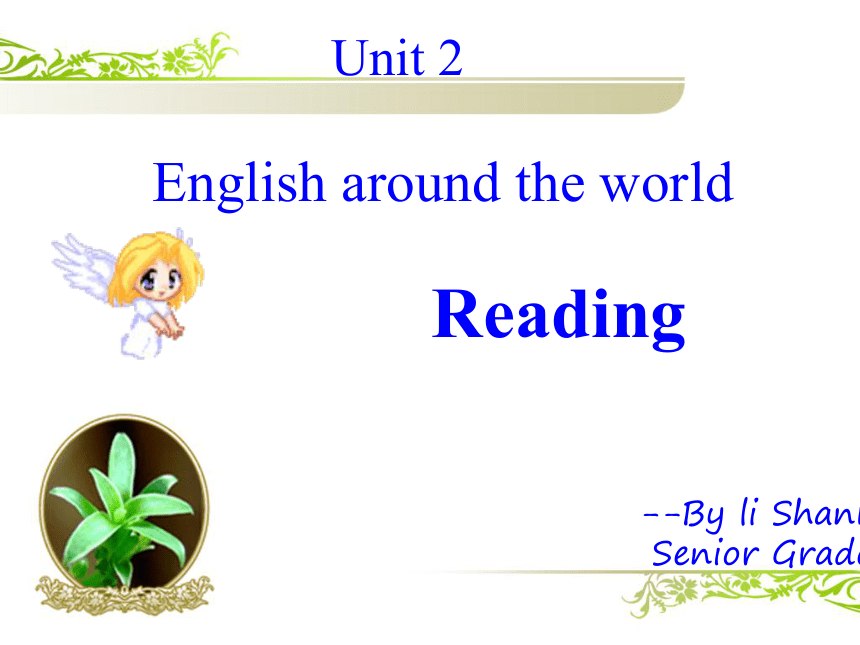
|
|
| 格式 | rar | ||
| 文件大小 | 1.1MB | ||
| 资源类型 | 教案 | ||
| 版本资源 | 人教版(新课程标准) | ||
| 科目 | 英语 | ||
| 更新时间 | 2009-01-08 00:00:00 | ||
图片预览


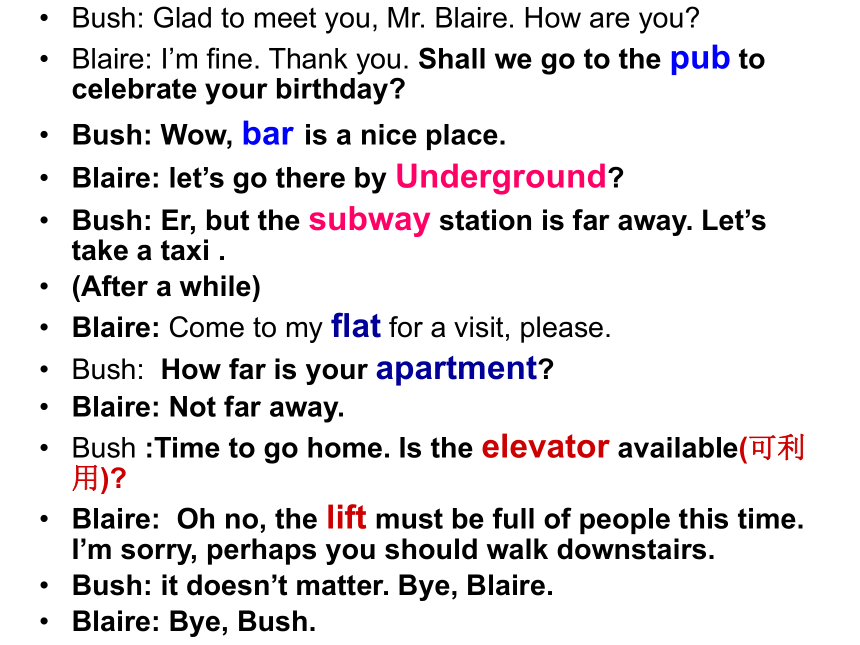
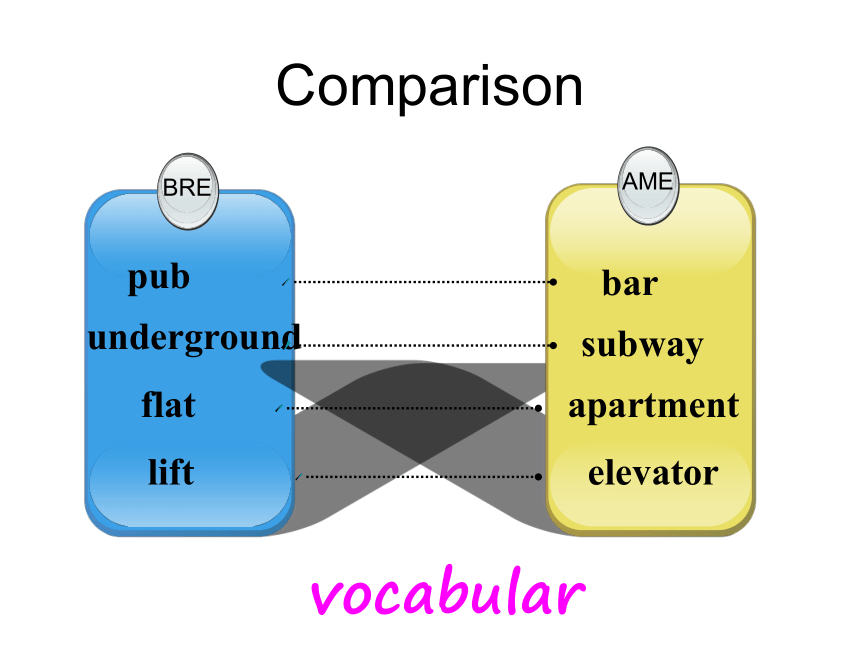
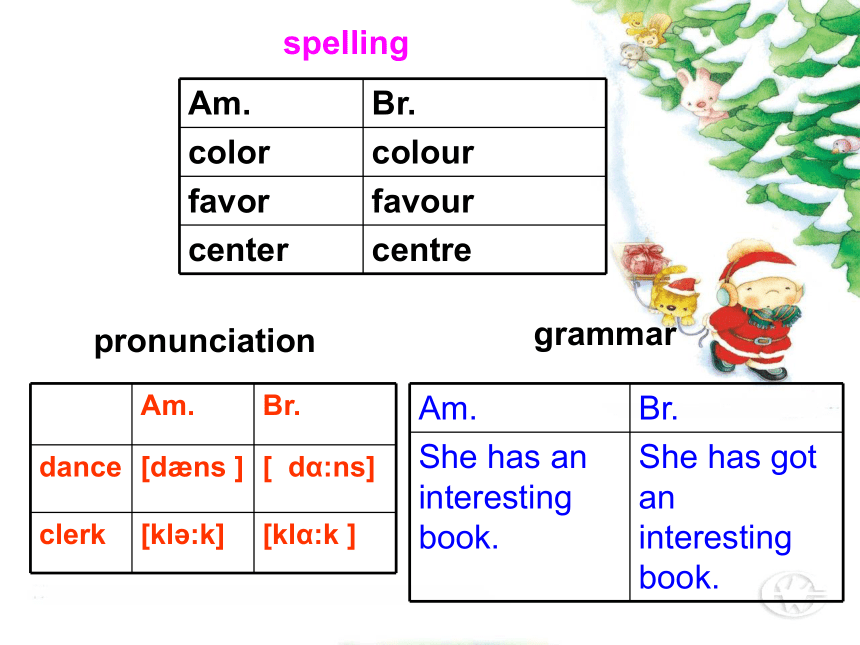
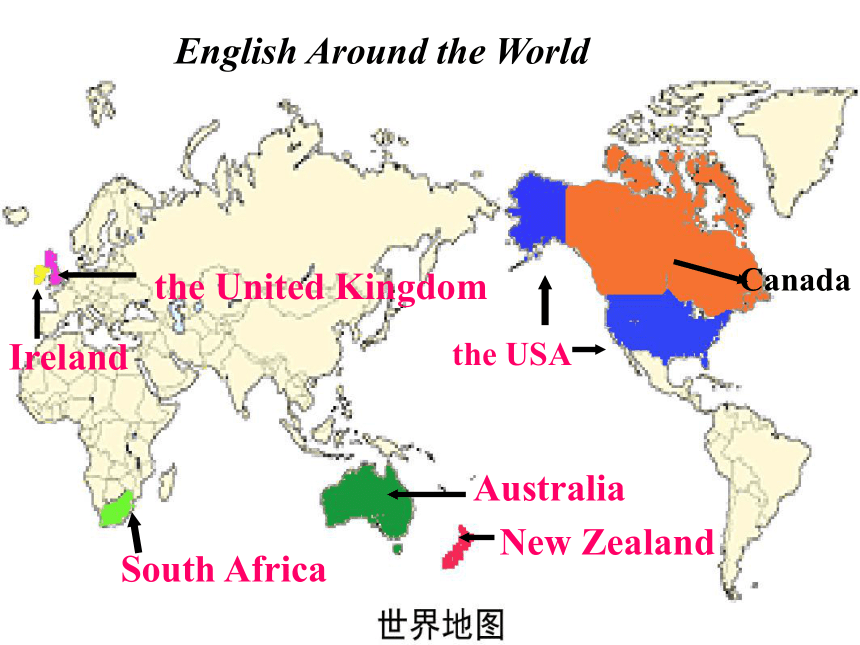
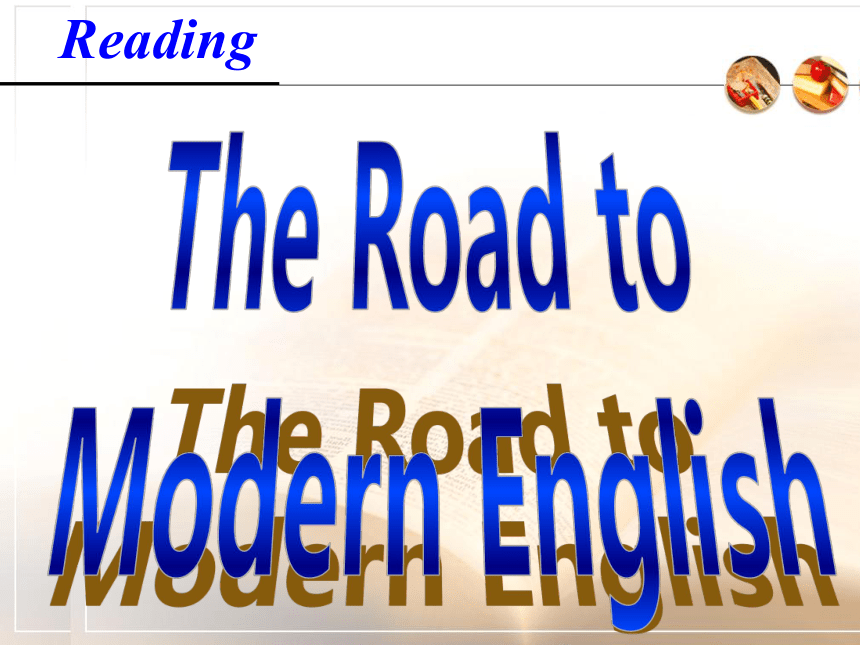
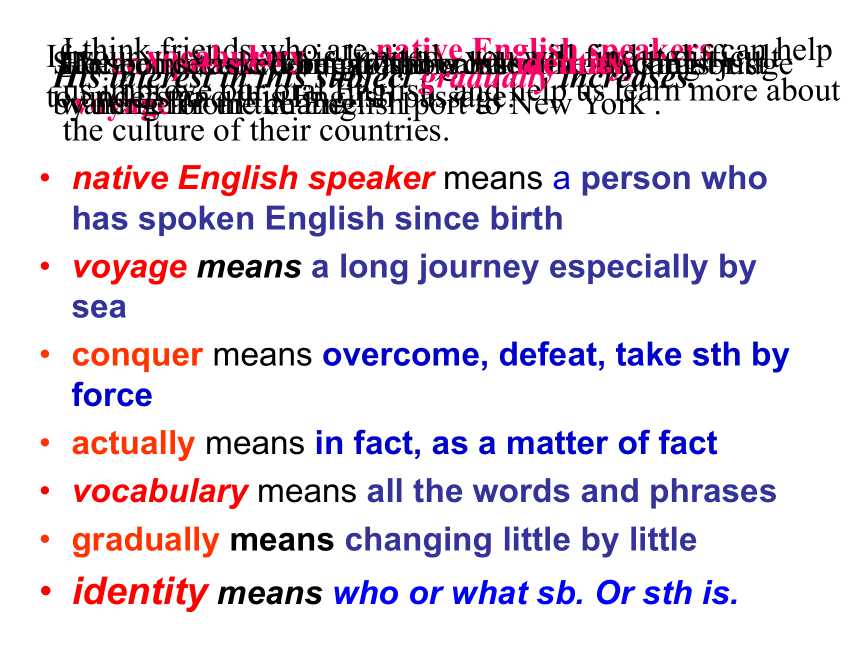
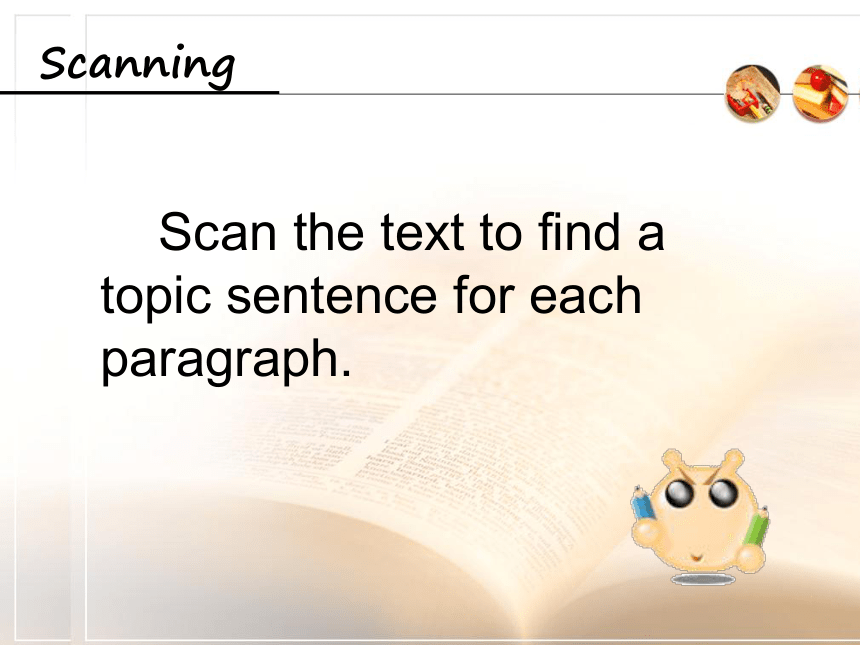
文档简介
课件20张PPT。Unit 2English around the worldReading--By li Shanmei
Senior Grade OneDialogueBush: Glad to meet you, Mr. Blaire. How are you?
Blaire: I’m fine. Thank you. Shall we go to the pub to celebrate your birthday?
Bush: Wow, bar is a nice place.
Blaire: let’s go there by Underground?
Bush: Er, but the subway station is far away. Let’s take a taxi .
(After a while)
Blaire: Come to my flat for a visit, please.
Bush: How far is your apartment?
Blaire: Not far away.
Bush :Time to go home. Is the elevator available(可利用)?
Blaire: Oh no, the lift must be full of people this time. I’m sorry, perhaps you should walk downstairs.
Bush: it doesn’t matter. Bye, Blaire.
Blaire: Bye, Bush.
Comparisonpubbarundergroundsubwayflatapartment
elevator
lift
vocabularypronunciationgrammarspellingEnglish Around the Worldthe USACanadaNew ZealandAustraliaSouth Africathe United KingdomIreland The Road to
Modern EnglishReadingnative English speaker means a person who has spoken English since birth
voyage means a long journey especially by sea
conquer means overcome, defeat, take sth by force
actually means in fact, as a matter of fact
vocabulary means all the words and phrases
gradually means changing little by little
identity means who or what sb. Or sth is.
I think friends who are native English speakers can help us improve our oral English, and help us learn more about the culture of their countries. Titanic hit an iceberg(冰山) and sank on its first voyage from the English port to New York .She conquered her fear and crossed the shaking bridge by herself He seems to be doing nothing, but actually he is just waiting for the chance.If your vocabulary is limited , you will find it difficult to understand this English passage. His interest in this subject gradually increases. The police asked him to show his identity card. Scanning Scan the text to find a topic sentence for each paragraph.Development of Englishthe end of the 16th century the next century today They lived in:_________People from England ______________ _______other parts of the world.More people speak English as their ________________________than ever before.Population: ___________about 5 to 7 millionEnglandThe result: ____________________________________made voyages to conquer English began to be spoken in many other countries. first, second or a foreign languageDetailed reading: Task 1
Read paragraph 3-4 carefully and then get the useful information to finish the form.Detailed reading: Task 2change and develop enrichedIt was based more on
German than the
English we speak at present.It became less like German and more like Danish and French.Difference:Development:Americathe 18th centurysettledspellinglatteridentityBesides the countries where English is used as a native language, where else is English used as a foreign or second language?
South Asia, India, South Africa, Singapore, Malaysia and China. Detailed reading: Task 3Summing upAt the end of the 16th century, about seven million people spoke English. Nearly all of them lived in___1___. As people from England made voyages to __2__ other parts of the world ,English began to be __3__ in many other countries. Now more people speak English than ever__4__. __5__English speakers can understand each other even __6___they don’t speak the _7_kind of English . __8__ ,English has changed and developed when cultures meet and __9__ with each other. From AD450 to 1150, new settlers in England _10_ the English language and enlarged its __11__. In 1620, British people began to move to other countries, and gradually English was spoken in many other countries. By the 19th century American English spelling got a separate __12__ when Noah Webster wrote his dictionary. At ___13___, more people speak English as their first, second or a foreign language than ever before. People in South Asia __14__ as India, Singapore speak fluent English. China may have the __15__number of English learners.At the end of the 16th century, about seven million people spoke English. Nearly all of them lived in England. As people from England made voyages to conquer other parts of the world ,English began to be spoken in many other countries. Now more people speak English than ever before. Native English speakers can understand each other even if they don’t speak the same kind of English . Actually, English has changed and developed when cultures meet and communicate with each other. From AD450 to 1150, new settlers in England enriched the English language and especially its vocabulary. In 1620, British people began to move to other countries, and gradually English was spoken in many other countries. By the 19th century American English spelling got a separate identity when Noah Webster wrote his dictionary. At present, more people speak English as their first, second or a foreign language than ever before. People in South Asia such as India, Singapore speak fluent English. China may have the largest number of English learners.
Post reading:Discuss in groupsWhy do you think people all over the world want to learn English?
HomeworkMemorize the new words we learned in this passage.
Recite paragraph 3, and paragraph 4.
Find the difficulties in this passage.
Senior Grade OneDialogueBush: Glad to meet you, Mr. Blaire. How are you?
Blaire: I’m fine. Thank you. Shall we go to the pub to celebrate your birthday?
Bush: Wow, bar is a nice place.
Blaire: let’s go there by Underground?
Bush: Er, but the subway station is far away. Let’s take a taxi .
(After a while)
Blaire: Come to my flat for a visit, please.
Bush: How far is your apartment?
Blaire: Not far away.
Bush :Time to go home. Is the elevator available(可利用)?
Blaire: Oh no, the lift must be full of people this time. I’m sorry, perhaps you should walk downstairs.
Bush: it doesn’t matter. Bye, Blaire.
Blaire: Bye, Bush.
Comparisonpubbarundergroundsubwayflatapartment
elevator
lift
vocabularypronunciationgrammarspellingEnglish Around the Worldthe USACanadaNew ZealandAustraliaSouth Africathe United KingdomIreland The Road to
Modern EnglishReadingnative English speaker means a person who has spoken English since birth
voyage means a long journey especially by sea
conquer means overcome, defeat, take sth by force
actually means in fact, as a matter of fact
vocabulary means all the words and phrases
gradually means changing little by little
identity means who or what sb. Or sth is.
I think friends who are native English speakers can help us improve our oral English, and help us learn more about the culture of their countries. Titanic hit an iceberg(冰山) and sank on its first voyage from the English port to New York .She conquered her fear and crossed the shaking bridge by herself He seems to be doing nothing, but actually he is just waiting for the chance.If your vocabulary is limited , you will find it difficult to understand this English passage. His interest in this subject gradually increases. The police asked him to show his identity card. Scanning Scan the text to find a topic sentence for each paragraph.Development of Englishthe end of the 16th century the next century today They lived in:_________People from England ______________ _______other parts of the world.More people speak English as their ________________________than ever before.Population: ___________about 5 to 7 millionEnglandThe result: ____________________________________made voyages to conquer English began to be spoken in many other countries. first, second or a foreign languageDetailed reading: Task 1
Read paragraph 3-4 carefully and then get the useful information to finish the form.Detailed reading: Task 2change and develop enrichedIt was based more on
German than the
English we speak at present.It became less like German and more like Danish and French.Difference:Development:Americathe 18th centurysettledspellinglatteridentityBesides the countries where English is used as a native language, where else is English used as a foreign or second language?
South Asia, India, South Africa, Singapore, Malaysia and China. Detailed reading: Task 3Summing upAt the end of the 16th century, about seven million people spoke English. Nearly all of them lived in___1___. As people from England made voyages to __2__ other parts of the world ,English began to be __3__ in many other countries. Now more people speak English than ever__4__. __5__English speakers can understand each other even __6___they don’t speak the _7_kind of English . __8__ ,English has changed and developed when cultures meet and __9__ with each other. From AD450 to 1150, new settlers in England _10_ the English language and enlarged its __11__. In 1620, British people began to move to other countries, and gradually English was spoken in many other countries. By the 19th century American English spelling got a separate __12__ when Noah Webster wrote his dictionary. At ___13___, more people speak English as their first, second or a foreign language than ever before. People in South Asia __14__ as India, Singapore speak fluent English. China may have the __15__number of English learners.At the end of the 16th century, about seven million people spoke English. Nearly all of them lived in England. As people from England made voyages to conquer other parts of the world ,English began to be spoken in many other countries. Now more people speak English than ever before. Native English speakers can understand each other even if they don’t speak the same kind of English . Actually, English has changed and developed when cultures meet and communicate with each other. From AD450 to 1150, new settlers in England enriched the English language and especially its vocabulary. In 1620, British people began to move to other countries, and gradually English was spoken in many other countries. By the 19th century American English spelling got a separate identity when Noah Webster wrote his dictionary. At present, more people speak English as their first, second or a foreign language than ever before. People in South Asia such as India, Singapore speak fluent English. China may have the largest number of English learners.
Post reading:Discuss in groupsWhy do you think people all over the world want to learn English?
HomeworkMemorize the new words we learned in this passage.
Recite paragraph 3, and paragraph 4.
Find the difficulties in this passage.
